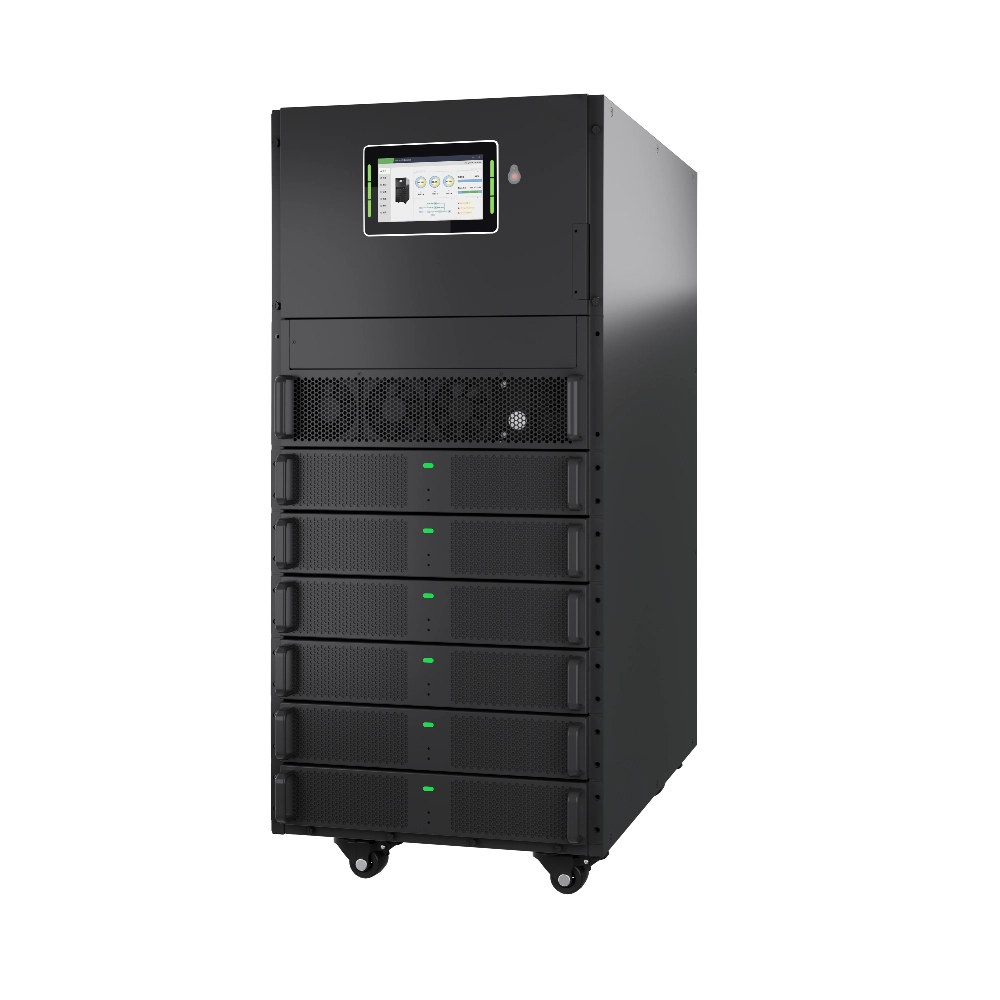Роль конденсаторов в системах ИБП
Release time: 2025-07-24
Capacitors are essential components in a Система ИБП (источник бесперебойного питания), performing vital functions such as smoothing, filtering, and storing energy. A typical UPS unit contains various types of capacitors, both in the main power section and on the printed circuit boards (PCBs).
Capacitors are generally encased in aluminum or chromium-plated cylinders and consist of two conducting surfaces—usually metallic plates or electrodes—separated and insulated by a dielectric medium. The amount of charge a capacitor can store is measured in farads and is determined by the thickness of the dielectric layer and the surface area of the conductive plates.
Capacitors in the power section of a UPS system can be classified as follows:
- AC Input Capacitors: These are part of the UPS input filter and/or power factor correction stage. They handle the incoming mains supply and play a crucial role in smoothing input transients, reducing reflected switching noise, and minimizing harmonic distortion.
- AC Output Capacitors: These capacitors form part of the UPS output filters. They help control the waveform of the output voltage supplied to the critical load and provide reactive power.
- DC Capacitors: These capacitors are a key part of the rectification system and energy storage. They smooth fluctuations in voltage (also known as supply voltage filtering) and store energy for brief periods during transitions between mains and battery power, ensuring an uninterrupted supply to the critical load.
All capacitors in the UPS system are exposed to high-frequency switching, UPS loads, and physical/electrical stress from the operational environment.
How Long Do Capacitors Last?
Capacitors, along with batteries, are among the most vulnerable components in a UPS system and are prone to failure over time. They degrade as the electrolyte, paper, and aluminum foil inside them break down physically and chemically. Factors such as excessive heat or high current can accelerate this degradation.
While a well-rated capacitor can last up to 10 years under favorable conditions, industry best practices recommend replacing capacitors within 4 to 8 years to prevent the risk of a serious failure. In certain situations, capacitors may need to be replaced as early as 4 years, particularly in demanding roles or environments.
Factors Affecting Capacitor Lifespan
Several factors can shorten the lifespan of a capacitor:
- Excessive Current: Capacitors exposed to currents higher than their rated capacity will suffer damage. While short bursts of high ripple current may be harmless, sustained exposure can cause overheating and premature failure.
- Overuse: The harder a capacitor has to work, the quicker it will degrade. If it frequently filters high levels of voltage noise or transients, the wear and tear on the capacitor will be faster.
- Excessive Heat: Heat can cause the electrolyte inside the capacitor to evaporate, leading to unsafe internal pressure. This heat can come from internal factors, such as a blocked air filter, or external factors, such as high ambient temperatures in the UPS’s location.
Signs of Capacitor Failure
Service engineers can identify potential capacitor failures through several indicators during routine UPS maintenance:
- Oil Leakage: Leaking oil increases temperature and impedance within the capacitor.
- Deformation: Caused by excessive heat or internal fluid leaks.
- Scorched Wires: Overcurrent can damage wires connected to the capacitor, which can be spotted through thermal imaging.
- Burnt Valve Cap Protrusion: This indicates internal stress and may lead to failure if the protrusion breaks.
- Temperature Increase: Monitoring temperature is key. A rise in internal temperature, detectable with a thermometer or thermal imager, suggests a failing capacitor.
- Capacitance Drop: Over time, a capacitor’s internal structure degrades, causing its capacitance to fall out of tolerance. This can be measured using a capacitance meter, which is available in most quality digital multimeters.
What Happens When a Capacitor Fails?
Capacitor failures typically fall into two categories:
- Open Failure: The capacitor stops working but shows little visible evidence of failure. This type of breakdown can go unnoticed, though it still impacts UPS performance.
- Short-Circuit Failure: The capacitor leaks dielectric material, which can cause visible damage and might even produce a popping sound. This failure is more catastrophic, as the electrolyte is conductive and corrosive, potentially damaging surrounding components.
In some cases, a capacitor may fail gradually, losing its tolerance without any obvious signs.
Some capacitors, especially electrolytic types, have built-in pressure relief valves or caps to allow the controlled release of internal pressure in the event of failure. However, this can still lead to increased temperature and the risk of electrolyte leakage.
Consequences of Capacitor Failure in a UPS
The effects of capacitor failure on a UPS depend on the type of failure and the configuration of the capacitors (whether in series or parallel). In systems with multiple capacitors, one failure may not immediately affect performance, as the remaining capacitors can compensate for the lost functionality. However, even a single failed capacitor can degrade UPS performance, reducing filtering capability, increasing noise and harmonic distortion, decreasing energy storage, and even damaging the battery strings.
In extreme cases, a serious capacitor failure can force the UPS into bypass mode, which leaves the critical load unprotected.
Specific consequences of deteriorating AC capacitors include:
- Increased inverter distortion
- System instability, particularly in parallel configurations
- Sudden breakdowns with noise and fumes, potentially damaging other UPS components
- Unscheduled downtime
- Increased maintenance costs and repairs
- Risks of fire or explosions due to capacitor failure
Conclusion
Capacitors are vital to the efficient operation of Системы бесперебойного питания, playing a role in filtering, energy storage, and maintaining voltage stability. Over time, their performance can deteriorate due to heat, excessive current, and overuse. Regular maintenance and timely replacement of capacitors can help prevent significant failures and ensure continuous, reliable operation of UPS systems.


